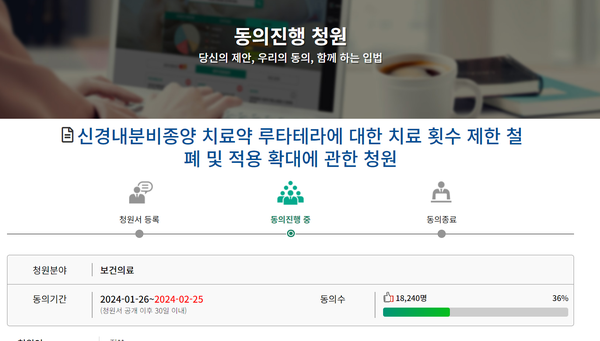Patients with neuroendocrine tumors and their families are appealing to the National Assembly, urging a resolution to the issue of restricting the availability of domestic treatments for Lutathera. Lutathera treats neuroendocrine tumors that may manifest anywhere in the endocrine system, such as the gastrointestinal tract, pancreas, and lungs. The plea is for the accessibility of Lutathera treatment within their homeland, ensuring they can undergo the treatment on their soil.
On Friday, Jin Mi-hyang, the president of the Korean Association for Neuroendocrine Tumor Patients, a group of around 4,000 patients, submitted a petition on the National Assembly's online platform, advocating for the removal of restrictions on the number of treatments and the broadening of the scope for the application of the neuroendocrine tumor treatment drug Lutathera.

“Neuroendocrine tumors began to gain attention among the Korean general public when Apple founder Steve Jobs passed away, but social awareness is still low, and there are not many treatments because it is a rare cancer," Jin said in the petition.
She went on to say that treatments for neuroendocrine tumors include hormone therapy, Afinitor, Sutent, and Lutathera.
Lutathera won approval from the Ministry of Food and Drug Safety in 2020 and health insurance coverage in 2022.
“Patients are allowed to receive Lutathera up to six treatments, including four reimbursed treatments and two 100 percent non-reimbursed treatments," she noted.
Lutathera is a nuclear medicine treatment that targets the somatostatin receptor, which is only expressed in neuroendocrine tumors, and combines a somatostatin-like substance with the radioactive isotope lutecium. It has a powerful targeted treatment effect because it attaches to the somatostatin receptor of cancer cells and intensively bombards them with radioactive substances.
However, due to the limiting the number of Lutathera treatments to a maximum of six in Korea, patients with neuroendocrine tumors are being forced to undergo expeditionary treatment abroad.
“Patients who require more than six sessions of Lutatherapy are now unable to undergo treatment in Korea due to the imposed limit. So, they are traveling to countries such as Malaysia, Germany, India, and others to receive the necessary treatment,” Jin said.
Last year, the Korean Health Insurance Review and Assessment Service (HIRA) classified overseas expeditionary treatment on par with domestic treatment. Consequently, Korean patients who had initially commenced their treatment domestically were compelled to bear the entire medical cost without any reimbursement.
"To make matters worse, HIRA recently cut the reimbursement for patients who received four treatments of lutecium, which is similar to Lutathera, overseas before the 2020 MFDS approval. As a result, patients who received treatment abroad before the MFDS approval are once again forced to leave the country for overseas treatment," Jin said.
Jin contended that restricting the number of treatments for Lutatherapy was an uncommon practice.
"In various countries, if a patient seeks Lutatherapy, the treating physician has the flexibility to administer an unlimited number of treatments, guided by the treatment's anticipated effectiveness as determined through blood tests and the patient's health condition," Jin said.
"Unlike any other nation globally, Korea imposes a restriction on the number of treatments, resulting in government regulations playing a decisive role in determining the fate of patients' lives."
The Korean Association for Neuroendocrine Tumor Patients is urging the government to address three key issues.
Firstly, they propose restricting the number of covered treatments of Lutathera while advocating for the elimination of limits on treatments for patients opting for treatment without reimbursement.
The second request pertains to the current positioning of Lutathera as a third-line treatment for gastrointestinal neuroendocrine tumors and a fourth-line treatment for pancreatic neuroendocrine tumors. This situation necessitates substantial tumor growth before the treatment can be administered.
"There are numerous expert opinions suggesting that Lutathera is expected to be more effective when the tumor is smaller. The observed phenomenon in the treatment experiences of individual patients undergoing bypass aligns with these expert opinions," Jin said.
The patient group insists that Lutathera should be employed as a first-line treatment or, at the very least, a second-line treatment when the tumor size is minimal.
The third request involves ensuring that patients' rights to treatment in Korea are not infringed upon due to their previous treatment experiences abroad.
"Consider a scenario where a critically ill patient must endure a flight of over 10 hours to receive treatment from a foreign doctor with whom communication is a challenge, all to spend a little more time with their loved ones. Envision the family grappling with such a situation," Jin said. "Neuroendocrine tumor patients also aspire to receive treatment akin to Korean citizens. I earnestly appeal for the protection of public health through an administration that is considerate of patients' needs."
As of 2:06 p.m. Tuesday, the patient group’s petition garnered 18,240 people’s signatures.

